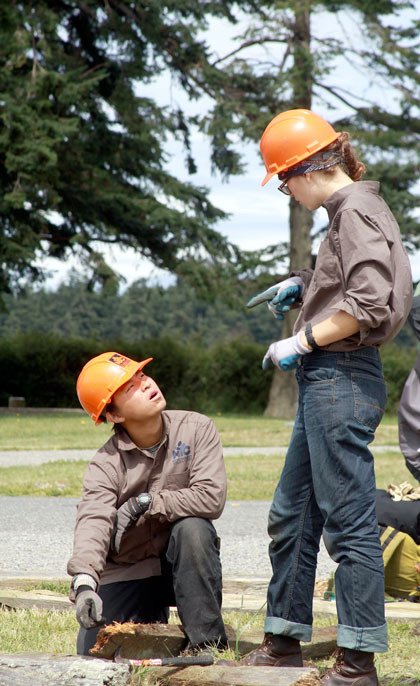While a gentle breeze blew through Ebey’s Prairie Thursday, the only sounds that could be heard from the overlook were the chorus of birds, hum of a distant tractor and steady tap of a hammer.
The presence of six crew members and two leaders with the Northwest Youth Corps should’ve been enough to shatter the tranquility.
Yet, the group quietly went about its work, trying to reassemble a split rail fence and place it in a new, more welcoming location.
Hardly a word was uttered among the group. They communicated through soft taps on the shoulder, hand signals, facial expressions and other forms of sign language.
Every one of the nine total crew members in this group is deaf.

The workers have been in Coupeville for nearly two weeks, constructing a new trail, repairing others, and doing other maintenance in Ebey’s Landing National Historical Reserve.
The program serving deaf and hard of hearing youth is in its fourth year with Northwest Youth Corps and is one of the few of its kind in the country.
The program works in partnership with the National Park Service, providing paid opportunities in the outdoors that emphasize personal growth, teamwork and stewardship.
“We just believe in the power of connecting young people to service and being outdoors in gaining skills,” said Jay Satz, senior director for partnerships and innovation at Northwest Youth Corps.
“Four years ago, we made a concerted effort that we wanted to reach out to the deaf and hard of hearing community. It’s been an interesting journey.”
For the crew who came to Whidbey Island, Coupeville was part of a five-week odyssey covering three national parks.
The group on Friday wrapped up its work in the reserve, a unit of the National Park Service, and is headed for projects in the Olympic and North Cascades national parks.
Their work spoke volumes.

“They have exceeded our expectations,” said Jason Benson, preservationist with the National Park Service in Coupeville. “They got a lot of work done. They did a great job.”
The group, which ranged in ages from 16 to 19, was turned loose on an ambitious trail project in the reserve that has been in the planning stages for years, Benson said.
Although the work isn’t expected to be done until August, the group started blazing a new trail that will ultimately connect the bluff trail near Ebey’s Landing with the Kettles Trail system.
“Without them, we wouldn’t be able to finish the trail that is going to be opening up in August for the (National Park Service) centennial,” said Holly Richards, outreach coordinator for the reserve.
“They knocked it out so fast. This has been one of the best work crews I’ve ever worked with.”
The crew was led by Cody Reidy, 28, who is deaf, and two other adult assistant crew leaders who have normal hearing.
One of the assistants was Katherine O’Leary, a 22-year-old college student who joined the group as an interpreting intern. She is pursuing a double major in deaf studies and interpreting at Maryville College in Tennessee.
Using sign language with O’Leary as his interpreter, Reidy said that the group encountered communication problems along the way but worked through them and was lucky to have comfortable living arrangements in Coupeville compared to what’s ahead in the backcountry of the Olympics.
The group was able to camp in tents at Fort Casey State Park not far from a restroom.
“It was a great environment to be around to learn how to problem solve and break through communication barriers,” O’Leary said.
Still, she said there were challenges ranging from communication to accommodations. The group had to work out who was going to prepare meals. The wet weather compounded things at times as did crows that raided their garbage.
“I’m definitely going to appreciate a shower when I get done with this,” she said.
Overall, however, the group persevered and opened some eyes to their capabilities.
Satz said there can be a natural tendency to presume that a youth group with a disability needs additional oversight in respect to their safety in challenging environments. But through his experiences, he’s found that it takes little time to put those concerns at ease.
He said he sometimes has to remind staff members with the National Park Service to try not to be overly protective despite their well-meaning intentions.
“We taught them that deaf people have to navigate the world 24/7 and they’re safe and often have better systems than we do,” Satz said. “It’s been an education for us. We’re really committed to the deaf and hard of hearing population but can’t pretend we didn’t learn anything about it.”
Satz said this is his first experience working with the National Park Service and Ebey’s reserve staff in Coupeville and it’s been a favorable one.
“I think it’s one of the gems of the park service,” he said.
“I’ve been to Yellowstone, Yosemite and Grand Teton. There’s something remarkable about Ebey’s.”
He was pleased with what the youth crew has been able to accomplish.
“They’re kicking butt out there,” he said.


